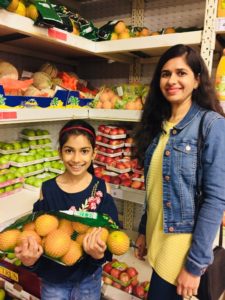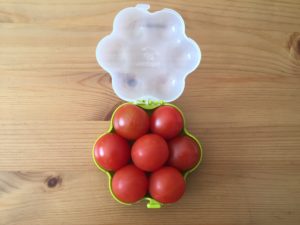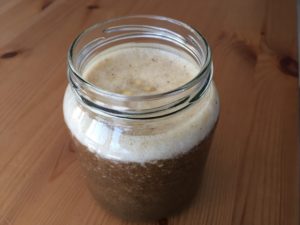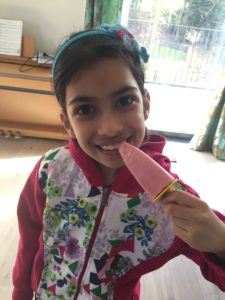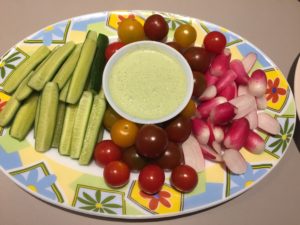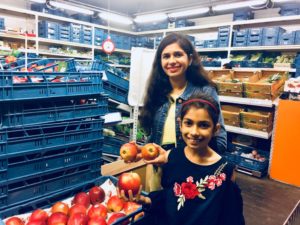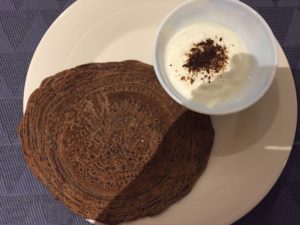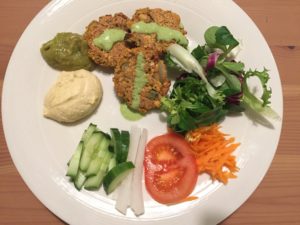
As a Nutritionist, I am in agony to plan healthy eating routine for a teen weighing more than a 100kg or suffering from Type II diabetes or diagnosed with high cholesterol. It’s a scary future we are heading towards. It disturbs me even more because all these conditions are highly preventable and reversible.
In most health surveys done worldwide, it is found that children are consuming far too much saturated fat, sugar and salt and not enough fruit and vegetables.
“Teenage girls are facing the risk of illnesses like cancer, heart disease, strokes and diabetes in later life by eating fewer than three servings of fruit and vegetables every day” – as per the Hindustan Times.
A recent diet survey in Beijing found that nearly two-thirds of students favoured sugary beverages and weren’t drinking enough water.
A UK Health report has equally bad findings stating children eat 50 per cent more added sugars than the recommended maximum and 25 per cent more saturated fat.
80% of US teens have an unhealthy diet.
1 in 3 Australian kid buys unhealthy takeaway meal daily.
Modern day couch potato lifestyle has adversely affected our kids. Chronic diseases and mental health problems have started to hamper the health of much younger groups- younger than we can imagine!
All one needs to control this scary scenario is to Eat Healthy ,Eat Natural and Eat Real. We as parents have to ensure to guide our kids right from the early years. The importance of eating right and worth of healthy body.
What is a well-balanced diet?
A well-balanced diet is one that contains enough (neither less nor more) of all food groups and hence nutrients. It is a perfect blend of proteins, fats, carbohydrates, vitamins and minerals. All from natural food and not out of a packet.
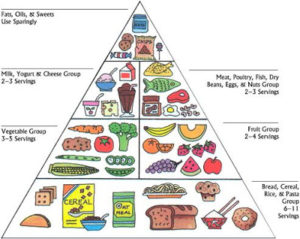
Where do we go wrong?
One main indicator is the changing patterns in food availability- more packaged than real and the increase in convenient easy to source food.
This becomes a bigger problem because parents are not aware of all the harmful effects of the entire bag of chips or packet of biscuits, colas and instant noodles their kids consume.
Popular advertisements showcase teens preparing their own pasta and noodles but these processed foods are extremely harmful in the long run.
The result from such a lifestyle is that we are taking in chemicals, hazardous trans fat, high saturated fat, excessive salt, artificial colouring and harmful preservatives. It’s not just about your child’s weight or waistline, but an unbalanced diet breaks almost every aspect of the body. What goes on your child’s plate, has an impact on everything: his productivity, memory, growth, and his overall health in later years of life.
If your child regularly feel gassy, constipated, always hungry, depressed, frequent bad moods, fatigued, cold, break out into rashes, have low immunity and avoid entire food group all together – then he is a candidate for an unbalanced diet.
Why are teens more subject to unbalanced diets?
Do you see your child opening the fridge or food cupboard once in two hours? Do they crave pizza or chips or ice-cream?
As teenagers grow and develop, it’s normal for them to feel hungry frequently. Your child’s body is going through a major growth spurt and extra food provides extra energy and nutrients to support this. The more instant-energy processed carbs they eat, the more unbalanced their diet will be.
What to feed? Refer to our blog Easy Healthy Snack ideas for Kids for details.(http://umanarula.com/blog/2018/06/10/easy-to-prepare-healthy-snack-ideas-for-kids/)
How frequently your child eats outside food?
Today’s trend veers more towards eating or ordering from out versus preparing at home – by this we cede our control over the quality of ingredients in the food that we are consuming to nourish our body. Also, not practicing proper meal times has become a part of our modern lifestyle today. But whatever you prepare at home even if its pizza or cheese fondue will be healthier than what you get outside.
Try and cook more at home – cook in batches if required – pre-prep ingredients – make it a family activity – but cook at home!
Planning and doing same may seem a little daunting at first, but is easily do-able once you get the hang of it. Well-planned meals will then become second nature to you.
How is your teen affected by social media and peers?
Social media, celebrities, peer pressure all lead our kids towards fad diets. Keto, Paleo, Lemon Detox, General Motors, Atkins…all contribute towards no balance. While they work short-term, over time they deplete the body of vital nutrients.
I find many teenage girls lacking in iron, calcium and other essential vitamins and minerals, irrespective of their age.
Your child need to know how every bite that they put into their bodies affects them. Educating your child about wholesome meal habits is an ongoing continuous process.
Tips to educate your child
- Show kids what “eating right” looks like: If eating healthy is routine for you, it will be for your child as well. You are your child’s best role model.
- Help them choose healthy: Visit a local farmer’s market over a supermarket. Processed options automatically get cut down.
- Create a healthy food environment: Involve your kids in meal planning,grocery shopping ,chopping the veggies, finding out a new recipe. These tasks are great bonding activities. Help your kids gain ownership and eat better.
- Avoid calling foods “good” or “bad”: All foods have a place in your plate. Instead of saying this is good or bad for you, make it fun to differentiate. Good foods such as whole foods can be green lighted, lesser healthy foods like vada pau can be orange and biscuits and French fries need not be off limits but are red-lighted in their minds. How? Read Further.
- Discuss how food affects the body: Discuss all good things about healthy eating and how it affects their body rather than just telling them to eat this not that. Explanation matters and clicks them.
- Make meals fun: You don’t need to lecture on good food during meal times. If pav-bhaji is on the menu today, add your hidden veggies inside. If pizza is demanded, add a salad as well. Make meal times happy, satisfying and a time to bond.
- Talk about portion size. It’s not just what kids eat that matter.Right Portions and timings matter too.
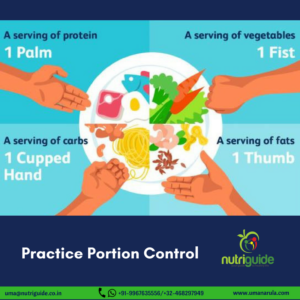
- Limit sweets.Explain why excess sweets can make them feel yucky from inside! Offer fresh fruit for desserts and limit treats to two or three times a week to keep cravings for sweets in check.
- Help kids stay in touch with their “hunger cues.”: Help your kid determine their own appetite and understand how much is enough. Chewing slowly, banning screens, portion control, tasting what they eat are all pointers to help them pay attention to how much they’re eating and when they’ve had enough.
- Change their meeting place: Rather than meeting up with their friends at the local cafe, suggest a food outlet that serves healthier foods or at swimming pool or basketball club or may be just a garden for a walk.
If you still think your child needs to lose or gain weight, do not self-diet. Speak to a nutritionist – this will help you chart out the best healthy eating routine for your child as per his specific requirements.
Follow us on fb https://www.facebook.com/UmaNarulaNutriguide/ for regular tips on health,wellness,eat right and much more.
Uma Narula is an award winning practising Nutritionist since 10 years.If you have any queries regarding your health and nutrition you can email at uma@nutriguide.co.in or call on +91 99676 35556/+32 468 29 79 49.
www.umanarula.com

